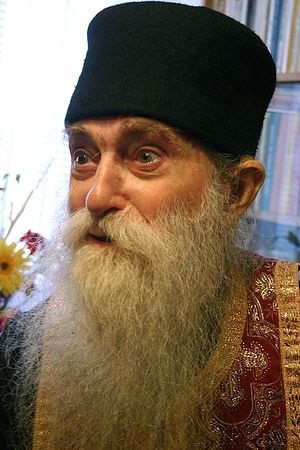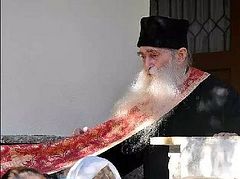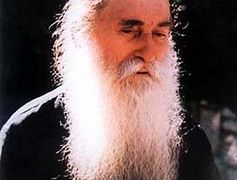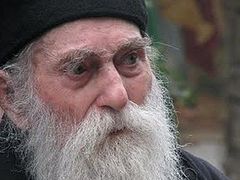Every time I find myself in the Monastery of St. Mary in Techirghiol, I am filled with trepidation at the thought of the multitude of my sins, known and unknown. And my first desire is to go to the cell of the great spiritual father Arsenie (Papacioc), to at least take his blessing. And when, contrary to expectation, you are honored with the great privilege of speaking with him, time begins to take on some kind of special dimension. In our age it rushes very quickly, and the Techirghiol saint exhorts us not to lose a single moment, but to use all the time allotted to us for our salvation.
“Concealed sin becomes all the greater”
—Choosing a spiritual father is a very difficult task, and just by finding him we understand how many highs and lows await us in the future, on the path along which we must bear our cross. Batushka, what would you advise us to do in order not to stray from the true path?
—Look, this state of inquisitiveness, as I always say, is the state of presence.[1] You should not just go to your spiritual father randomly, by inertia, and never confess mechanically and rationally, but always with feeling. To be able to think about salvation, you have to be well-confessed; it is a sacrament that saves. Confession is surely its own kind of catechism. You’re always examining yourself, but when you go see your spiritual father, you should under no circumstances be embarrassed: “Lord, I did it!” How can there be embarrassment here? Embarrassment is a weapon of the devil, dreadfully strong.
Something else you should know: If you hold some sin unconfessed within yourself, or you call it something else, it becomes all the greater. You should not be worried about what your spiritual father thinks. Good people, it’s not important at all! It’s important that you be saved, and not doomed to eternal torment due to hidden sins!
—Batushka, if someone’s sins are too great, sometimes when confessing he can lose the gift of speech, looking at this colossal sin. Maybe he sincerely repents of it, weeps, and prays, but he doesn’t have the strength to confess it…
—My brothers, the Savior was not crucified just for one category of sin, but for everything that is a sin on this earth. Then that means either you name all your sins in Confession—to receive forgiveness, or at the Dread Judgment—to receive punishment. You can conceal them, but they will not remain unnamed! Either now, with tears, before your spiritual father, who will understand you and absolve you of your sins, or defer it all the Righteous Judgment.
Confessed sins will not be taken into account at the Judgment, because the mercy of God forgives them; but what will you do with the unconfessed and hidden ones? St. John Chrysostom also teaches that the most important thing with which we must appear at the Judgment is the remission of sins.
“I don’t give penances which can be quickly fulfilled just to escape from them”
—What criteria should we use to choose a spiritual father?
—No one spiritual father is stronger than another. There are no good or bad spiritual fathers. It so happens that one initially has little experience, or one is not gifted with the spirit of love, so precious; but overall, the success of a confession does not depend on me, as a spiritual father. I, and others like me, feel wonderful when people tell us their most terrible sins, because we experience endless joy from having removed the stone from your soul. No matter how heavy the sin, God is unspeakably pleased by the repentance of one who confesses with his whole heart.
Every spiritual father has grace. It’s important to consider the four elements of the mystery of Confession: that you stop committing the sin, that you confess it, that your spiritual father absolves you of your sin, and that you fulfill the penance imposed by your spiritual father.
—When it is permissible to receive Holy Communion?
—Holy Communion is the highest sacrament of our Church. The fire in your heart will tell you when to prepare for Communion. After Confession, the spiritual father decides who is worthy and who is unworthy to commune of the Holy Mysteries. We cannot commune of the Body and Blood of Christ whenever we want to, but only with the blessing of our spiritual father. He is endowed with the power to bind and loose.
—What is the most severe penance with regards to Communion?
—Here the spiritual father bears an enormous responsibility. The most severe penance can forbid Communion even up to twenty-five years, but that means you would never commune. I, Arsenie, am not for such penances. He who has fallen into sin will get used to not communing, and might say, “So what? Did I live on Communion until now?” I’m for those penances he would fulfill day to day, consciously, not out of formal duty. I don’t give penances that can be fulfilled quickly just to escape from them. Lamentation from the heart won’t take much of your time; it’s always convenient to fulfill, and it occupies your whole being. You just say, “O, Lord!” A simple groaning does more than any prayer, more than if you read the “Our Father” fifteen times in a hurry.
“Blessed is he who knows his work and saves his soul”
—Do we have to learn to appreciate time?
—Only God can decide whether to give us more time and prolong our lives, and that’s so that we would be with Him as much as possible. Only by understanding this do we begin the work of our salvation. It is the most important, constant, unchanging, unforgettable goal—salvation. We can reach salvation no other way but by escaping our habits and routines. This is the only way to come to salvation. Blessed, blessed, a thousand times blessed is he who, at least somewhat coming to himself, prepares for his salvation, as the Church teaches us, according to the Gospel. When the sorrow around us becomes greater and greater, then only those who knew their work and saved their souls will be blessed.
—Speaking of the salvation of the soul, must we think about fasting? And if so, then about which—spiritual or bodily?
—Fasting in general has its strict principles. I tell those who come to me to fast, but only according to their strength and the established order, because you abstain from non-fasting food in vain if, having fasted for forty day, you then begin to burden your body, stuffing yourself beyond measure. Such a fast is in vain, and instead of leading to freedom and holiness, it leads to gluttony, which is a great sin. Therefore, I recommend fasting according to the strength of each, and I rule it out for children under seven, pregnant women, and the sick.
The fast of the soul is higher than the fast of the body. In vain do you not eat meat if you’re going to gnaw on the flesh of your neighbor. The optimal and most God-pleasing decision is fasting crowned with humility and prayer.
—Batushka, what do you advise us to do when we’re reading from a prayer book, but our thoughts are wandering in worldly affairs?
—I’m for prayer rising from the heart. Ups and downs happen even in the world of the saints. Even they can have moments of emptiness. Therefore, if while you are praying, evil spirits come to you to distract your mind from prayer, do not be afraid. There are no Christians, monks, who wouldn’t be tempted when they pray. When such jumps from one state to another occur, don’t stop praying, at least mentally. The power of prayer is great.
Some lose the quality of prayer. Others, praying with a humble heart, feel as if some kind of consolation comes to them, and they again pray, just as fervently, but only that such comfort would come to them again; however, such comfort can come from demons too. You can’t even imagine how glad the demons are to keep you in this state of false peace, so you would remain insensitive to the true consolation of prayer, bursting forth from the heart, without any personal interest and without interruption.
One girl, a medical student, told me, “Batushka, I bought myself every prayer book and akathist and I read them all, but there are times when my thoughts fly away from prayer.” Pray humbly to bring God into your heart, and not to rise in thought and wander God knows where in some heights! It’d be better to do nothing!
“It’s not enough that someone else prays for you”
—What would you advise if someone has loved ones living for pleasure, completely carefree? Is it enough that their loved ones pray for them?
—No. I tell everyone who comes to me that we are continually in need of prayer. The best thing for man is to always be with God. If you do not hold onto the rope tethering you to Heaven with all your hope, if you loosen your grip, then you will sink into non-existence, you will fall into sin, you will crash down into Hell. Hold on as you are able, however you can, but hold on with hope!
It’s not enough that someone else prays for you. The devil watches us continuously, and if we are not always with God, he likes it, he rejoices. People can choose to live in pleasure and negligence, or to live in prayer. One scholar said, “It’s not shameful to fall, being crushed by ailments, but it is shameful to die neglectful and haggard from delectations.”
We ought to tremble at the instructive word of St. Cyprian: “A certain grace finds a place for itself in us according to the measure that our ‘I’ is awakened and the passions uprooted. When the heart is cleansed from the passions, then affection for God is ignited.” Seeking God, they find Him according to the measure of their fulfillment.
—What is the measure of our prayer? Or, in other words, when should we give ourselves notice that we are asking too much of God and the Mother of God?
—Nothing is too much when it comes from a humble heart. The measure of the purification of the heart is the measure of the inflammation of affection for God. You won’t have any self-love anymore—that is, pride—when you see how great the mercy of God is towards us sinners. But what to say about the Mother of God? She is the Mistress of Heaven and Earth. And if I, a sinner, dare to ask God for length of days, it’s only in order to honor the Mother of God.
How can we say you’re asking Her for too much? We all should ask her for even more, because her love knows no bounds. I have said this many times. The Mother of God is greatly offended by those who do not ask her for anything.
God reveals Himself not so much to those who labor as to the simple and humble. To every ascetic struggler in Christ and the Mother of God I say, “Humble yourself—it’s worth it!”




